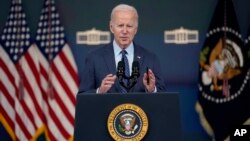President Joe Biden will speak to Chinese President Xi Jinping about the suspected surveillance balloon that he ordered shot down this month, underscoring the tense relations between the two countries over an incident that has already disrupted lines of bilateral communication at the highest levels.
"I expect to be speaking with President Xi, and I hope … we are going to the bottom of this. But I make no apologies for taking down that balloon," Biden said during Thursday remarks outlining his administration's plans to deal with the spy balloon and three unidentified aerial objects that he recently ordered taken down.
While debris is still being collected and studied, the other three objects that U.S. fighter jets shot down with missiles — over Alaska last Friday, over Canadian airspace near Alaska in coordination with the government in Ottawa on Saturday and over Michigan on Sunday — are not thought to be related to China's or any other country's surveillance program, Biden said.
"The intelligence community's current assessment is that these three objects are most likely balloons tied with private companies, recreation or research institutions studying weather or conducting other scientific research," he said.
Biden said the incident "underscores the importance of maintaining open lines of communication between our diplomats and military professionals" and reiterated that his administration is "not looking for a new Cold War" with China.
U.S.-China tensions have been high since the balloon entered U.S. airspace at the start of the month. U.S. Secretary of State Antony Blinken abruptly called off his planned February 5 trip to Beijing. Just days later, the Pentagon said China refused a call from U.S. Defense Secretary Lloyd Austin.
Administration officials say the device was part of an international "high-altitude balloon program for intelligence collection" by the Chinese People's Liberation Army that has flown over 40 countries. Beijing maintains that the balloon was a civilian airship used for meteorological research.
Balloon protocol
Biden laid out steps that he said his administration will take to "deal safely and effectively with the objects in our airspace," based on recommendations of an interagency team led by White House national security adviser Jake Sullivan.
Those steps include establishing an accessible and up-to-date inventory of unmanned, airborne objects above U.S. airspace; implementing measures to improve capacity to detect unmanned objects; and updating rules and regulations for launching and maintaining unmanned objects. The president is also tasking Blinken to lead an effort to help establish "common global norms" in this largely unregulated space.
Biden said his administration will determine classified parameters, to be shared with some members of Congress, on how the U.S. will deal with unmanned, unidentified airborne objects in the future, distinguishing those that pose a safety risk compared to benign ones.
"If any object presents a threat to the safety, security of the American people, I will take it down," he vowed.
In general, the U.S military intercepts all high-altitude aerial objects and engages those it cannot confirm as benign, Carl Schuster, a former director of operations at the U.S. Pacific Command's Joint Intelligence Center, told VOA.
"The number of 'shootdowns' will drop significantly once NORAD [North American Aerospace Defense Command] and the White House have confidence in a protocol that separates the benign from the concerning and threatening contacts. Until then, NORAD will continue to intercept them all and down those whose status is uncertain," he said.
Biden is under intense pressure from Republican lawmakers who are demanding more transparency on how his administration plans to deal with such incidents in the future. On Tuesday, the administration provided lawmakers with a classified briefing on the flying objects.
"We witnessed last week the president basically watching the balloon go all across America, had very little to say about it at the time, only passing reference to the episode in the State of the Union," Senate Minority Leader Mitch McConnell told reporters following the briefing. "The American people deserve to hear more from the president."
Dan Garrett, a former senior intelligence analyst at the U.S. Department of Defense, told VOA that Washington needs to significantly increase its counterintelligence resources to counter Chinese intelligence, surveillance and reconnaissance capabilities.
"And just as [Russian President Vladimir] Putin's war on Ukraine is the message, China's surveillance balloon flight over the United States is also the message: ‘The U.S. and the West are no longer safe. Challenge or defy us [Beijing and Moscow,] and you will pay a price. And lastly, we can reach and touch you at will,’" he said.
VOA congressional correspondent Katherine Gypson and VOA Mandarin Service reporter Xiaoshan Xue contributed to this report.





